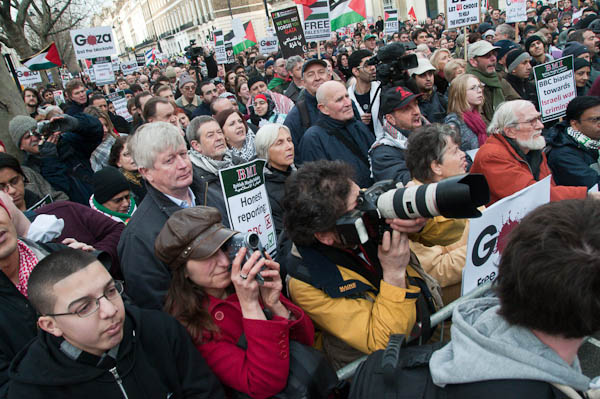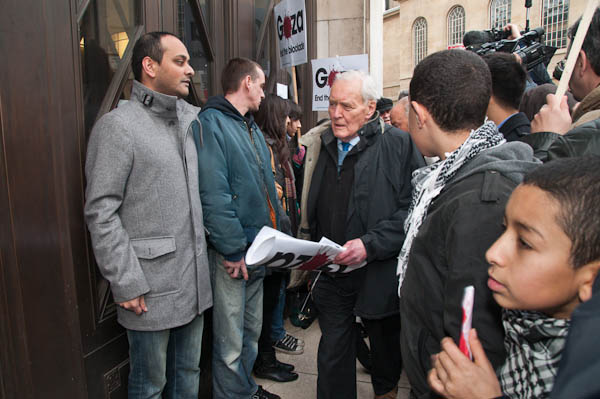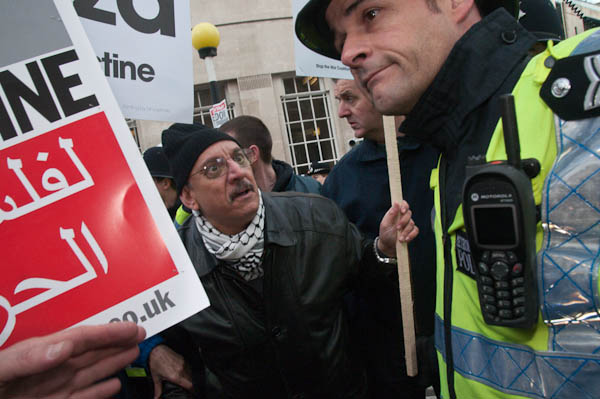Around 10,000 people attended a demonstration at the BBC building in central London on Saturday 24 Jan, 2009, in protest against the continuing siege of Gaza and to show their contempt at the partisan decision by the BBC not to broadcast the emergency appeal for Gaza. Protesters marched from a rally there to Trafalgar Square.

I woke this morning to hear Tony Benn being interviewed on Radio 4 about the BBC decision not to broadcast the Disasters Emergency Committee emergency appeal for humanitarian aid for Gaza. Taken on the spurious grounds of ‘impartiality’, it is a decision that is clearly partisan, placing the Corporation firmly on the side of the government of Israel and their sick fiction that there is no humanitarian crisis there.
I was delighted to be able to congratulate him on this performance in person as he sat outside Broadcasting House. In the interview he gave the details of the DEC appeal on air (see below), and he told me he had repeated this in BBC TV News interview. He also told me that the whole Today programme studio had been on his side, against the decision taken by the BBC hierarchy.
If you missed his contribution you can hear it again on the BBC web site. He tells people they can make cheques payable to the ‘Disaster Emergency committee Gaza Crisis’ and send them to PO Box 999, London EC3A 3AA, or go to any Post Office and make a payment quoting Freepay Number 1210. You can also go to the DEC web site and make a contribution,
Later the Today programme broadcast Caroline Thomson, one of the BBC bosses attempting to justify the decision. Frankly what she said was appalling and my immediate response was to log on to my computer and send my complaint to the BBC. You can hear her on the Today site, as well as International Development Secretary Douglas Alexander who asked the BBC to think again.

Tony Benn leads a small group into Broadcasting House to deliver a letter of protest
After a short press conference outside Broadcasting House, Tony Benn led others into the BBC building to deliver a letter of protest. Around 20 people entered and then a policeman stood in front of me and prevented me from following them. But they soon came out and moved up the road to where the rally was to take place. Police pushed a number of demonstrators who wanted to continue to demonstrate outside the BBC across the road away from the building, and tempers got a little raised, but there was no real violence.
Speaker after speaker denounced the BBC decision and called on them to change their mind, and there was considerable cheering when it was announced that other broadcasters had decided to run the appeal. Benn in his speech forecast that the pressure on the BBC which was coming from all sections of the community would soon force them to change their mind.
The demonstration had been planned long before the DEC appeal became an issue, and the starting point at Broadcasting House was chosen to draw attention to the lack of honest and unbiased coverage of the Israeli attack on Gaza by the BBC. This was not the fault of the many journalists who – in so far as the Israeli press ban had allowed – had worked as well as they could, but an institutional bias, in part resulting from the same kind of misapplication of the idea of impartiality that led them to the ridiculous decision over the DEC appeal. The demonstrations main aims, also reflected in the speeches at the rally were to call for an end to the blockade of Gaza, for a stop on arms sales to Israel and for the Israeli war criminals to be brought to justice.
The rally overran and the march proceeded to Trafalgar Square directly rather than as had originally been planned going past Downing Street, and shoes were thrown on the road outside the BBC rather than there. A few people were arrested for obstructing the police as the march reached Piccadilly Circus, and stewards halted the march, apparently demanding that those arrested should be released before they went on. But after around ten minutes the march moved on anyway to a final rally at Trafalgar Square. As this got under way I left, walking past many police vans parked around the square and in Whitehall. There had been a very strong police presence throughout.
At home I read the Press Association report of the demonstration. Ridiculously it stated there had been 400 demonstrators at the BBC, and I think this was the figure used in the BBC news I heard at 6pm. On their web site the BBC now says 2,000. The report on Sky quotes a police estimate of 5,000 – which would normally mean there were 10,000 on the march. It would seem that the PA reporter only looked at the few people on the pavement outside the BBC for what was essentially a press conference (the police wouldn’t allow demonstrators to remain there) and ignored – or didn’t notice – the thousands across the road.

Police clear demonstrators away from Broadcasting House
More pictures on My London Diary